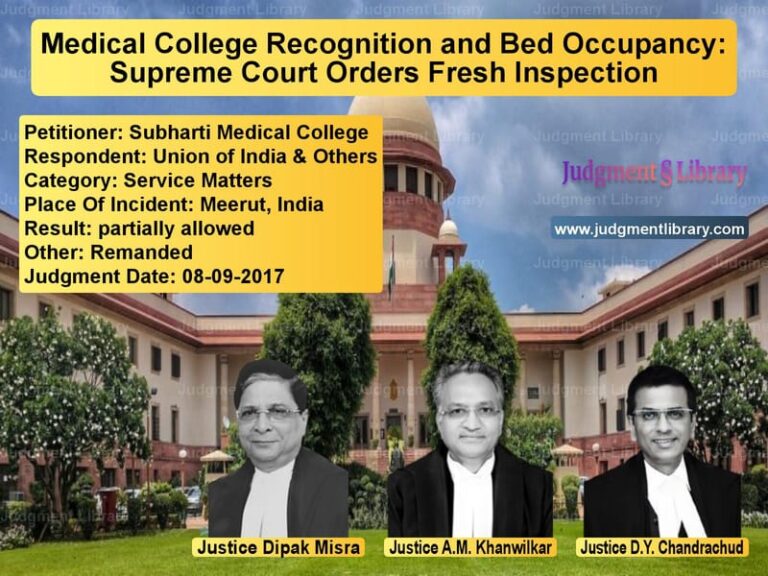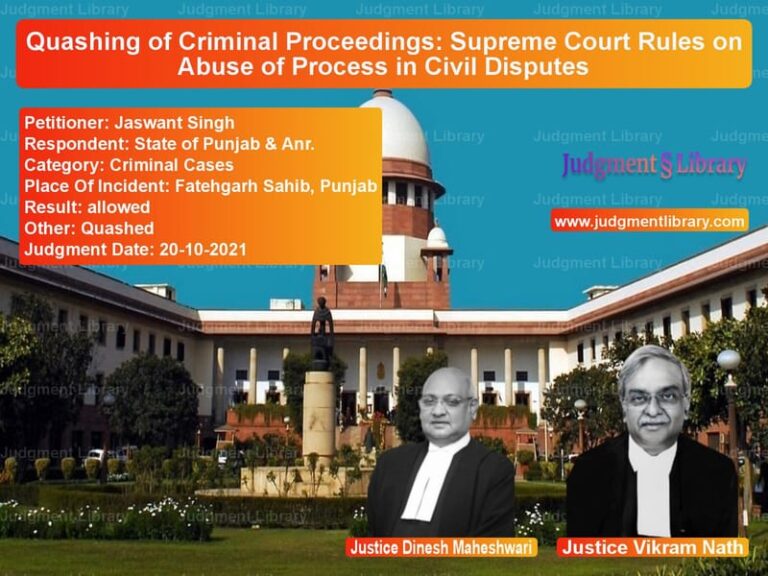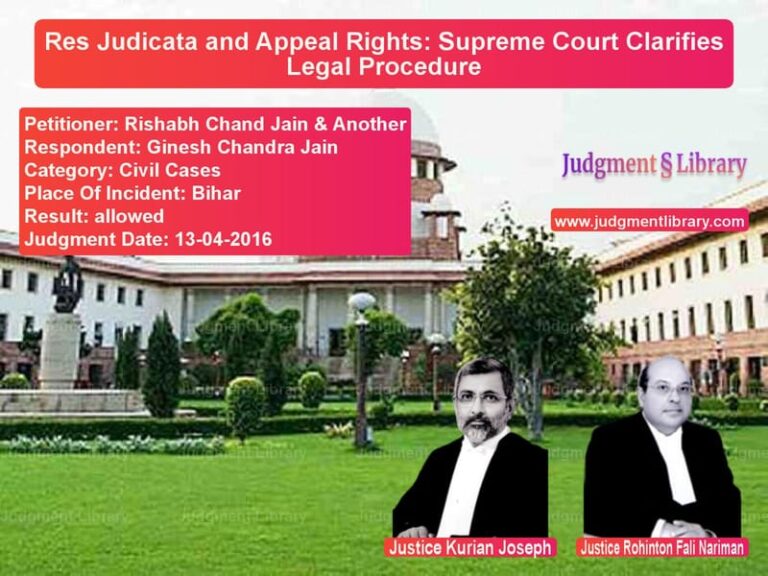Light Motor Vehicle License Validity for Transport Vehicles: Supreme Court Clarifies Legal Position
The case of Mukund Dewangan vs. Oriental Insurance Co. Ltd. revolves around the critical legal question of whether a driver holding a license for light motor vehicles (LMV) requires an additional endorsement to drive a transport vehicle that falls under the LMV category. The Supreme Court extensively examined the provisions of the Motor Vehicles Act, 1988 and clarified the interpretation of driving license requirements.
Background of the Case
The appellant, Mukund Dewangan, filed an appeal before the Supreme Court challenging the decision of lower courts regarding the insurance liability in case of an accident involving a transport vehicle driven by a driver holding an LMV license.
The case involved multiple connected appeals from various High Courts where the issue of whether an LMV license holder needed an additional transport vehicle endorsement was in dispute.
Key Legal Issue
The central issue before the Supreme Court was:
- Whether a driver with a valid LMV license requires an additional endorsement to drive a transport vehicle if the vehicle’s gross vehicle weight (GVW) does not exceed 7500 kg.
Relevant Provisions of the Motor Vehicles Act, 1988
The Supreme Court analyzed multiple provisions of the Motor Vehicles Act, 1988, including:
- Section 2(21) – Definition of Light Motor Vehicle (LMV).
- Section 2(47) – Definition of Transport Vehicle.
- Section 3 – Necessity for driving license.
- Section 10 – Form and content of driving licenses.
According to Section 2(21), a Light Motor Vehicle (LMV) includes a transport vehicle whose GVW does not exceed 7500 kg. Section 10(2) classifies vehicles into different categories, including LMV and Transport Vehicles.
Petitioner’s Arguments
The petitioner, Mukund Dewangan, contended that:
- A driver holding an LMV license should be allowed to drive any transport vehicle that falls within the LMV category (<7500 kg GVW).
- The requirement for an additional transport endorsement for LMV transport vehicles was unnecessary and contrary to the provisions of the Act.
- Previous judgments had created confusion regarding the interpretation of LMV and Transport Vehicle classifications.
Respondent’s Arguments
The insurance company and other respondents argued:
- Section 10(2) distinguishes LMVs from transport vehicles.
- Driving a transport vehicle, even if it falls within the LMV category, requires an additional endorsement under Section 3(1).
- The insurance company was not liable for compensation if the driver lacked the necessary endorsement.
Supreme Court’s Analysis
The Supreme Court examined previous conflicting decisions, including:
- National Insurance Co. Ltd. vs. Swaran Singh (2004) – Defined the scope of liability in motor insurance cases.
- New India Assurance Co. Ltd. vs. Roshanben Rahemansha Fakir (2008) – Addressed the requirement of transport vehicle endorsements.
- Annappa Irappa Nesaria vs. National Insurance Co. Ltd. (2008) – Clarified the classification of LMV licenses.
The Court held that:
- An LMV license holder is authorized to drive transport vehicles with a GVW of up to 7500 kg without requiring an additional transport endorsement.
- The distinction between LMV and Transport Vehicle is based on weight classification rather than usage (private or commercial).
- The amendment of Section 10 in 1994 did not alter the fundamental classification of LMVs.
- The insurance company was liable to compensate for accidents involving transport vehicles driven by LMV license holders.
Final Judgment
The Supreme Court ruled in favor of Mukund Dewangan and made the following key observations:
- Drivers holding an LMV license can drive transport vehicles up to 7500 kg without any additional endorsement.
- The distinction between LMVs and transport vehicles applies only to weight classification, not license endorsements.
- The insurance company cannot deny liability on the basis that the driver lacked a transport vehicle endorsement.
Impact of the Judgment
This landmark ruling clarified a long-standing legal ambiguity regarding LMV license validity for transport vehicles. The decision:
- Ensures uniform application of licensing provisions across India.
- Prevents insurance companies from denying claims based on technicalities.
- Simplifies compliance for commercial drivers.
Conclusion
The Supreme Court’s judgment in Mukund Dewangan vs. Oriental Insurance Co. Ltd. is a significant ruling that removes unnecessary restrictions on LMV license holders. By interpreting the Motor Vehicles Act in a manner that promotes fairness and legal clarity, the Court has provided much-needed relief to drivers and vehicle owners across India.
Don’t miss out on the full details! Download the complete judgment in PDF format below and gain valuable insights instantly!
Download Judgment: Mukund Dewangan vs Oriental Insurance C Supreme Court of India Judgment Dated 11-02-2016-1741852591683.pdf
Direct Downlaod Judgment: Direct downlaod this Judgment
See all petitions in Motor Vehicle Act
See all petitions in Compensation Disputes
See all petitions in Road Accident Cases
See all petitions in Judgment by Arun Mishra
See all petitions in Judgment by Kurian Joseph
See all petitions in allowed
See all petitions in supreme court of India judgments February 2016
See all petitions in 2016 judgments
See all posts in Accident Cases Category
See all allowed petitions in Accident Cases Category
See all Dismissed petitions in Accident Cases Category
See all partially allowed petitions in Accident Cases Category







